The Impact of Structured Learning on Student Engagement Report
VerifiedAdded on 2020/09/17
|6
|1197
|42
Report
AI Summary
This report investigates the impact of structured classroom environments, specifically focusing on the use of checklists and learning stations, on student engagement. The research question explores how these structured elements affect student involvement in the classroom. The rationale emphasizes the importance of understanding teaching practices that cater to diverse student needs and promote a positive learning environment. The literature review introduces the concept of learning stations as a method to engage students through fun activities and structured tasks designed to develop specific competencies. It also discusses student engagement, its importance, and the role of multiple intelligences in fostering a conducive learning atmosphere. The report references key studies by Junco, Denny, Shernoff, and others to support its findings, highlighting the benefits of structured learning and the positive impact of classroom checklists and rewards on student participation and academic performance. The report suggests that the use of multiple intelligences and fun activities can enhance student interest and make them more connected to their studies. It provides insights into how teachers can create an environment where students are encouraged to learn and actively participate in classroom activities.
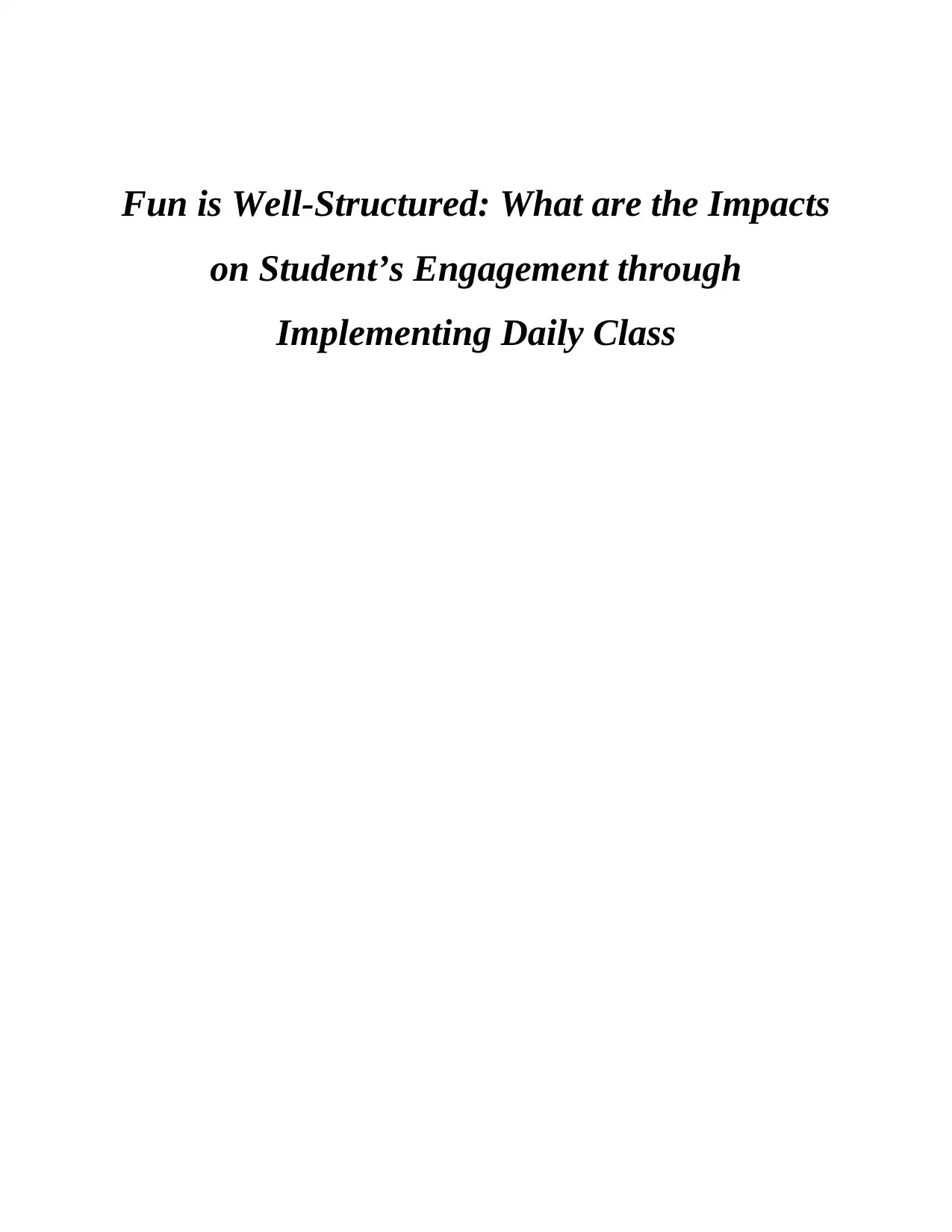
Fun is Well-Structured: What are the Impacts
on Student’s Engagement through
Implementing Daily Class
on Student’s Engagement through
Implementing Daily Class
Paraphrase This Document
Need a fresh take? Get an instant paraphrase of this document with our AI Paraphraser
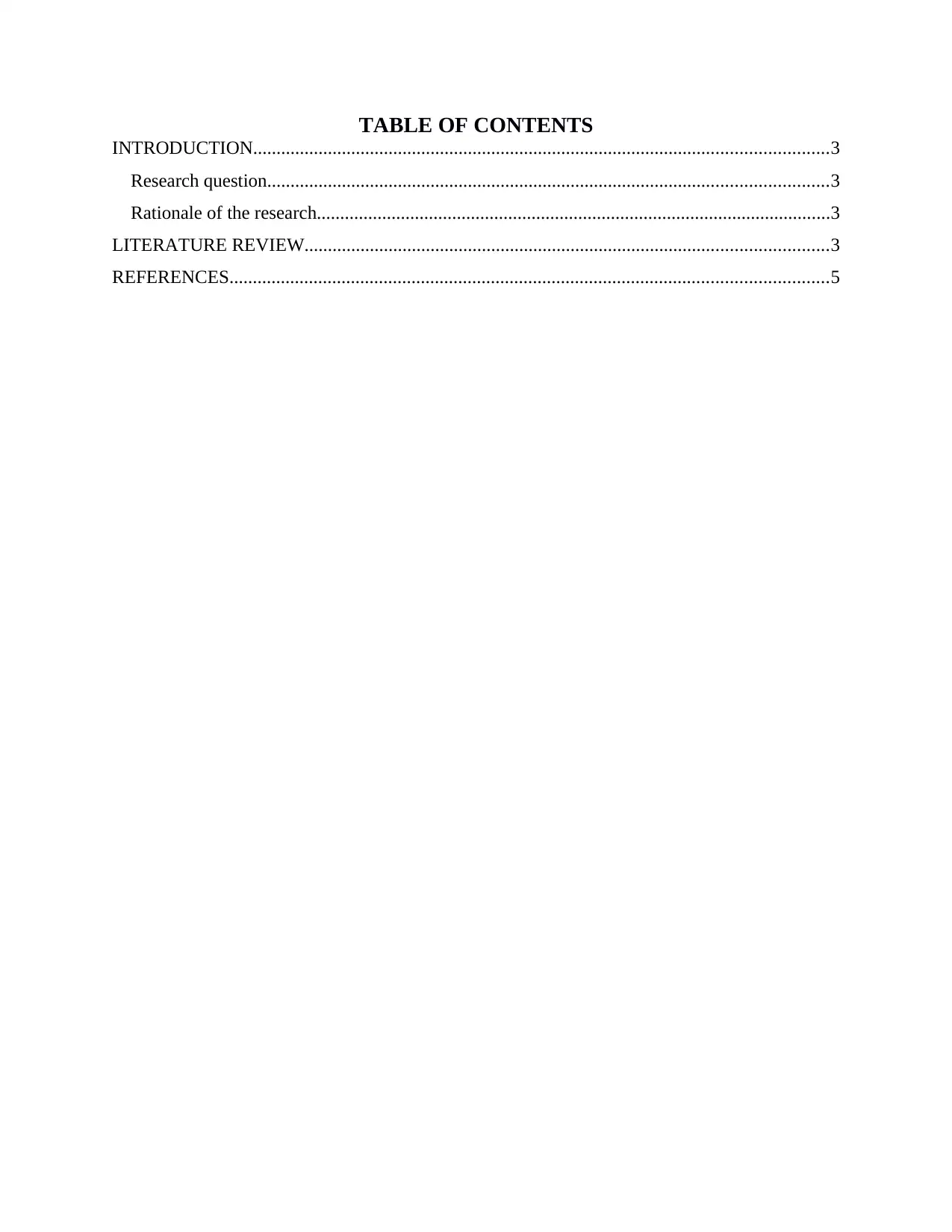
TABLE OF CONTENTS
INTRODUCTION...........................................................................................................................3
Research question........................................................................................................................3
Rationale of the research..............................................................................................................3
LITERATURE REVIEW................................................................................................................3
REFERENCES................................................................................................................................5
INTRODUCTION...........................................................................................................................3
Research question........................................................................................................................3
Rationale of the research..............................................................................................................3
LITERATURE REVIEW................................................................................................................3
REFERENCES................................................................................................................................5
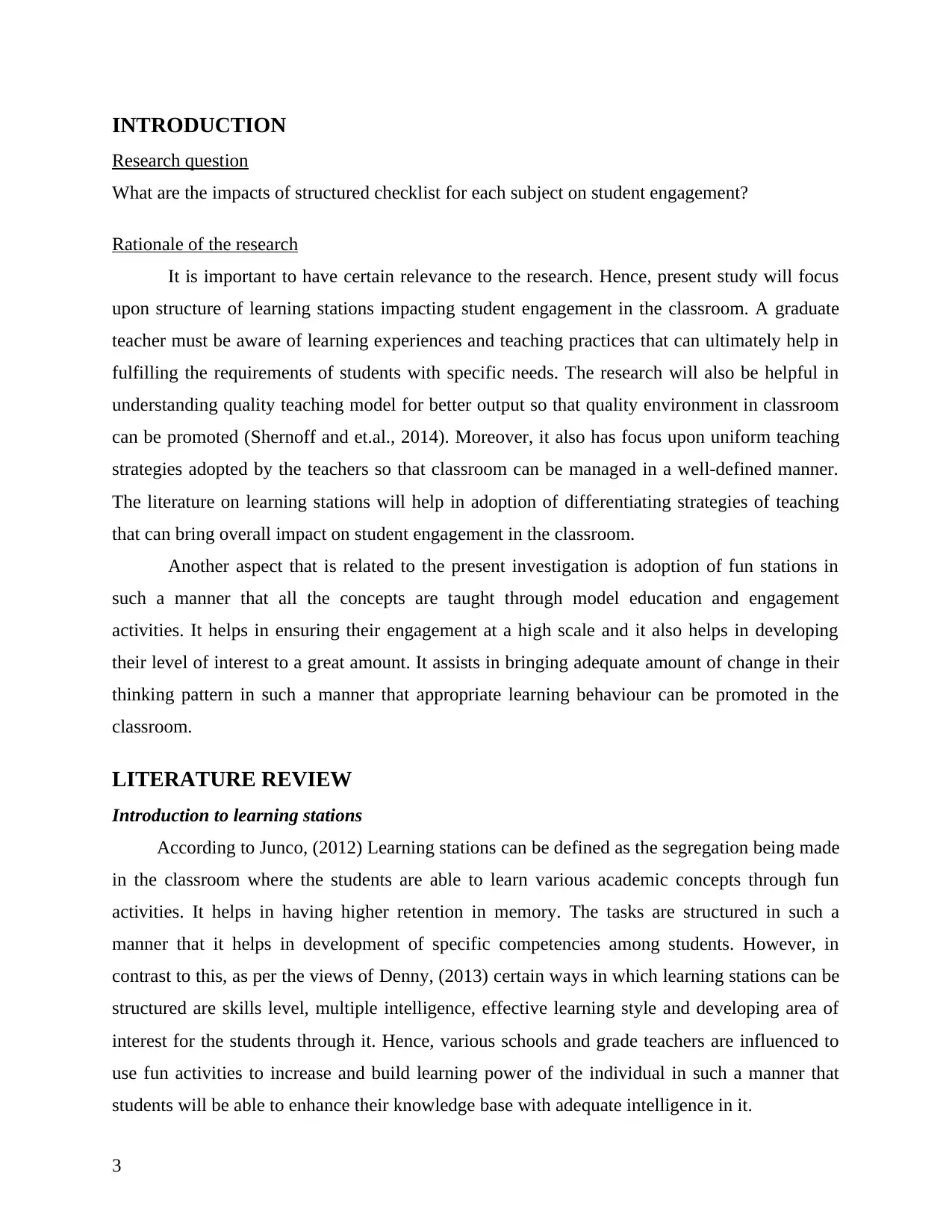
INTRODUCTION
Research question
What are the impacts of structured checklist for each subject on student engagement?
Rationale of the research
It is important to have certain relevance to the research. Hence, present study will focus
upon structure of learning stations impacting student engagement in the classroom. A graduate
teacher must be aware of learning experiences and teaching practices that can ultimately help in
fulfilling the requirements of students with specific needs. The research will also be helpful in
understanding quality teaching model for better output so that quality environment in classroom
can be promoted (Shernoff and et.al., 2014). Moreover, it also has focus upon uniform teaching
strategies adopted by the teachers so that classroom can be managed in a well-defined manner.
The literature on learning stations will help in adoption of differentiating strategies of teaching
that can bring overall impact on student engagement in the classroom.
Another aspect that is related to the present investigation is adoption of fun stations in
such a manner that all the concepts are taught through model education and engagement
activities. It helps in ensuring their engagement at a high scale and it also helps in developing
their level of interest to a great amount. It assists in bringing adequate amount of change in their
thinking pattern in such a manner that appropriate learning behaviour can be promoted in the
classroom.
LITERATURE REVIEW
Introduction to learning stations
According to Junco, (2012) Learning stations can be defined as the segregation being made
in the classroom where the students are able to learn various academic concepts through fun
activities. It helps in having higher retention in memory. The tasks are structured in such a
manner that it helps in development of specific competencies among students. However, in
contrast to this, as per the views of Denny, (2013) certain ways in which learning stations can be
structured are skills level, multiple intelligence, effective learning style and developing area of
interest for the students through it. Hence, various schools and grade teachers are influenced to
use fun activities to increase and build learning power of the individual in such a manner that
students will be able to enhance their knowledge base with adequate intelligence in it.
3
Research question
What are the impacts of structured checklist for each subject on student engagement?
Rationale of the research
It is important to have certain relevance to the research. Hence, present study will focus
upon structure of learning stations impacting student engagement in the classroom. A graduate
teacher must be aware of learning experiences and teaching practices that can ultimately help in
fulfilling the requirements of students with specific needs. The research will also be helpful in
understanding quality teaching model for better output so that quality environment in classroom
can be promoted (Shernoff and et.al., 2014). Moreover, it also has focus upon uniform teaching
strategies adopted by the teachers so that classroom can be managed in a well-defined manner.
The literature on learning stations will help in adoption of differentiating strategies of teaching
that can bring overall impact on student engagement in the classroom.
Another aspect that is related to the present investigation is adoption of fun stations in
such a manner that all the concepts are taught through model education and engagement
activities. It helps in ensuring their engagement at a high scale and it also helps in developing
their level of interest to a great amount. It assists in bringing adequate amount of change in their
thinking pattern in such a manner that appropriate learning behaviour can be promoted in the
classroom.
LITERATURE REVIEW
Introduction to learning stations
According to Junco, (2012) Learning stations can be defined as the segregation being made
in the classroom where the students are able to learn various academic concepts through fun
activities. It helps in having higher retention in memory. The tasks are structured in such a
manner that it helps in development of specific competencies among students. However, in
contrast to this, as per the views of Denny, (2013) certain ways in which learning stations can be
structured are skills level, multiple intelligence, effective learning style and developing area of
interest for the students through it. Hence, various schools and grade teachers are influenced to
use fun activities to increase and build learning power of the individual in such a manner that
students will be able to enhance their knowledge base with adequate intelligence in it.
3
⊘ This is a preview!⊘
Do you want full access?
Subscribe today to unlock all pages.

Trusted by 1+ million students worldwide
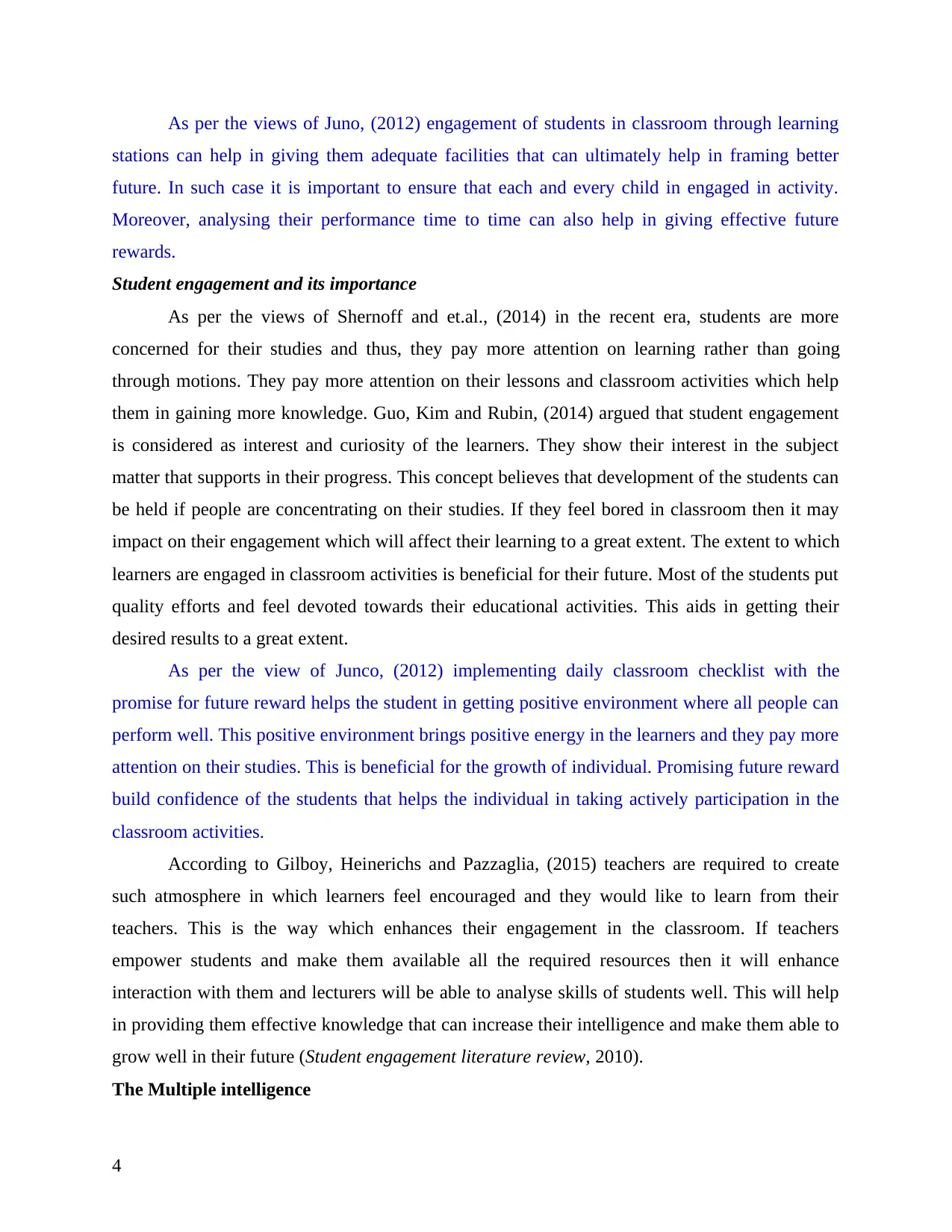
As per the views of Juno, (2012) engagement of students in classroom through learning
stations can help in giving them adequate facilities that can ultimately help in framing better
future. In such case it is important to ensure that each and every child in engaged in activity.
Moreover, analysing their performance time to time can also help in giving effective future
rewards.
Student engagement and its importance
As per the views of Shernoff and et.al., (2014) in the recent era, students are more
concerned for their studies and thus, they pay more attention on learning rather than going
through motions. They pay more attention on their lessons and classroom activities which help
them in gaining more knowledge. Guo, Kim and Rubin, (2014) argued that student engagement
is considered as interest and curiosity of the learners. They show their interest in the subject
matter that supports in their progress. This concept believes that development of the students can
be held if people are concentrating on their studies. If they feel bored in classroom then it may
impact on their engagement which will affect their learning to a great extent. The extent to which
learners are engaged in classroom activities is beneficial for their future. Most of the students put
quality efforts and feel devoted towards their educational activities. This aids in getting their
desired results to a great extent.
As per the view of Junco, (2012) implementing daily classroom checklist with the
promise for future reward helps the student in getting positive environment where all people can
perform well. This positive environment brings positive energy in the learners and they pay more
attention on their studies. This is beneficial for the growth of individual. Promising future reward
build confidence of the students that helps the individual in taking actively participation in the
classroom activities.
According to Gilboy, Heinerichs and Pazzaglia, (2015) teachers are required to create
such atmosphere in which learners feel encouraged and they would like to learn from their
teachers. This is the way which enhances their engagement in the classroom. If teachers
empower students and make them available all the required resources then it will enhance
interaction with them and lecturers will be able to analyse skills of students well. This will help
in providing them effective knowledge that can increase their intelligence and make them able to
grow well in their future (Student engagement literature review, 2010).
The Multiple intelligence
4
stations can help in giving them adequate facilities that can ultimately help in framing better
future. In such case it is important to ensure that each and every child in engaged in activity.
Moreover, analysing their performance time to time can also help in giving effective future
rewards.
Student engagement and its importance
As per the views of Shernoff and et.al., (2014) in the recent era, students are more
concerned for their studies and thus, they pay more attention on learning rather than going
through motions. They pay more attention on their lessons and classroom activities which help
them in gaining more knowledge. Guo, Kim and Rubin, (2014) argued that student engagement
is considered as interest and curiosity of the learners. They show their interest in the subject
matter that supports in their progress. This concept believes that development of the students can
be held if people are concentrating on their studies. If they feel bored in classroom then it may
impact on their engagement which will affect their learning to a great extent. The extent to which
learners are engaged in classroom activities is beneficial for their future. Most of the students put
quality efforts and feel devoted towards their educational activities. This aids in getting their
desired results to a great extent.
As per the view of Junco, (2012) implementing daily classroom checklist with the
promise for future reward helps the student in getting positive environment where all people can
perform well. This positive environment brings positive energy in the learners and they pay more
attention on their studies. This is beneficial for the growth of individual. Promising future reward
build confidence of the students that helps the individual in taking actively participation in the
classroom activities.
According to Gilboy, Heinerichs and Pazzaglia, (2015) teachers are required to create
such atmosphere in which learners feel encouraged and they would like to learn from their
teachers. This is the way which enhances their engagement in the classroom. If teachers
empower students and make them available all the required resources then it will enhance
interaction with them and lecturers will be able to analyse skills of students well. This will help
in providing them effective knowledge that can increase their intelligence and make them able to
grow well in their future (Student engagement literature review, 2010).
The Multiple intelligence
4
Paraphrase This Document
Need a fresh take? Get an instant paraphrase of this document with our AI Paraphraser
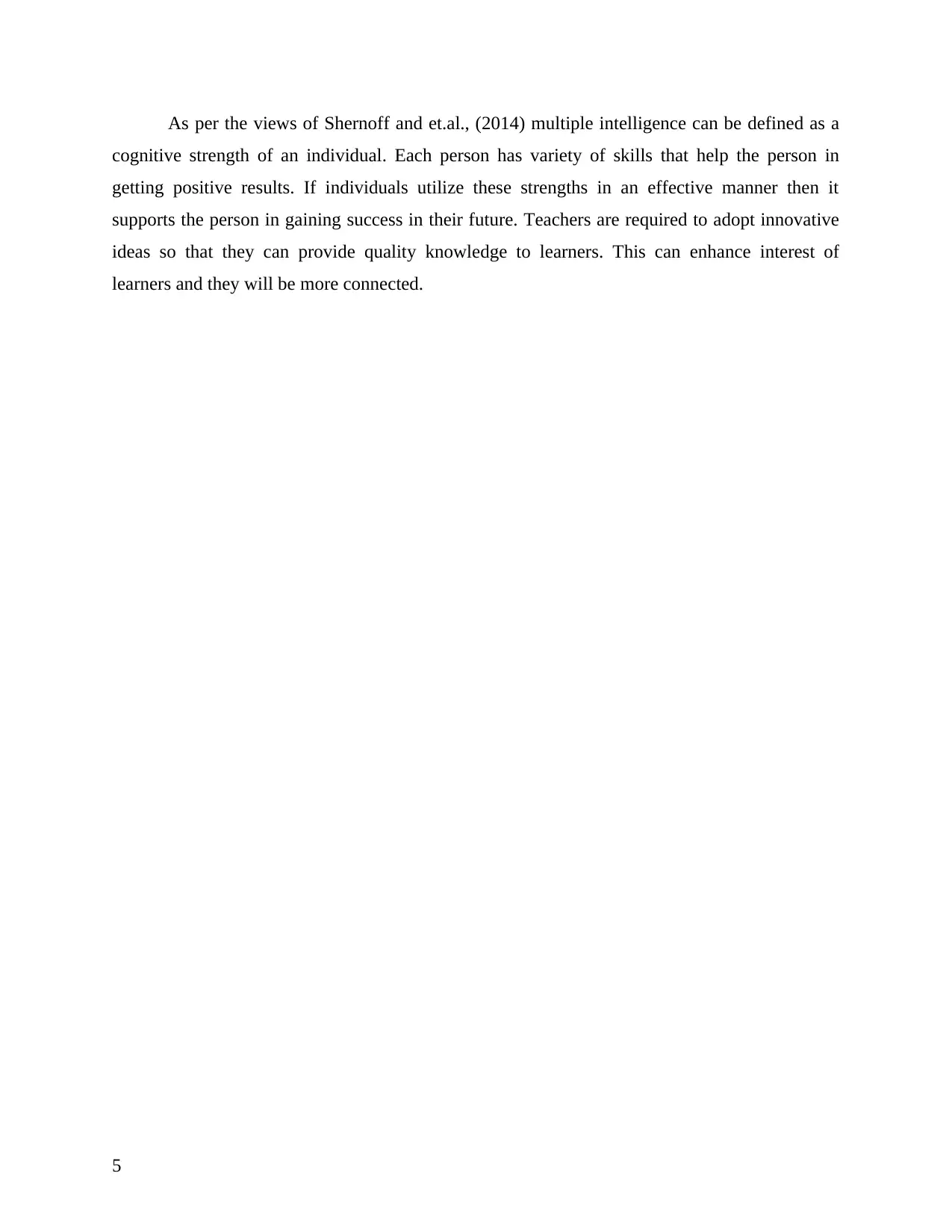
As per the views of Shernoff and et.al., (2014) multiple intelligence can be defined as a
cognitive strength of an individual. Each person has variety of skills that help the person in
getting positive results. If individuals utilize these strengths in an effective manner then it
supports the person in gaining success in their future. Teachers are required to adopt innovative
ideas so that they can provide quality knowledge to learners. This can enhance interest of
learners and they will be more connected.
5
cognitive strength of an individual. Each person has variety of skills that help the person in
getting positive results. If individuals utilize these strengths in an effective manner then it
supports the person in gaining success in their future. Teachers are required to adopt innovative
ideas so that they can provide quality knowledge to learners. This can enhance interest of
learners and they will be more connected.
5
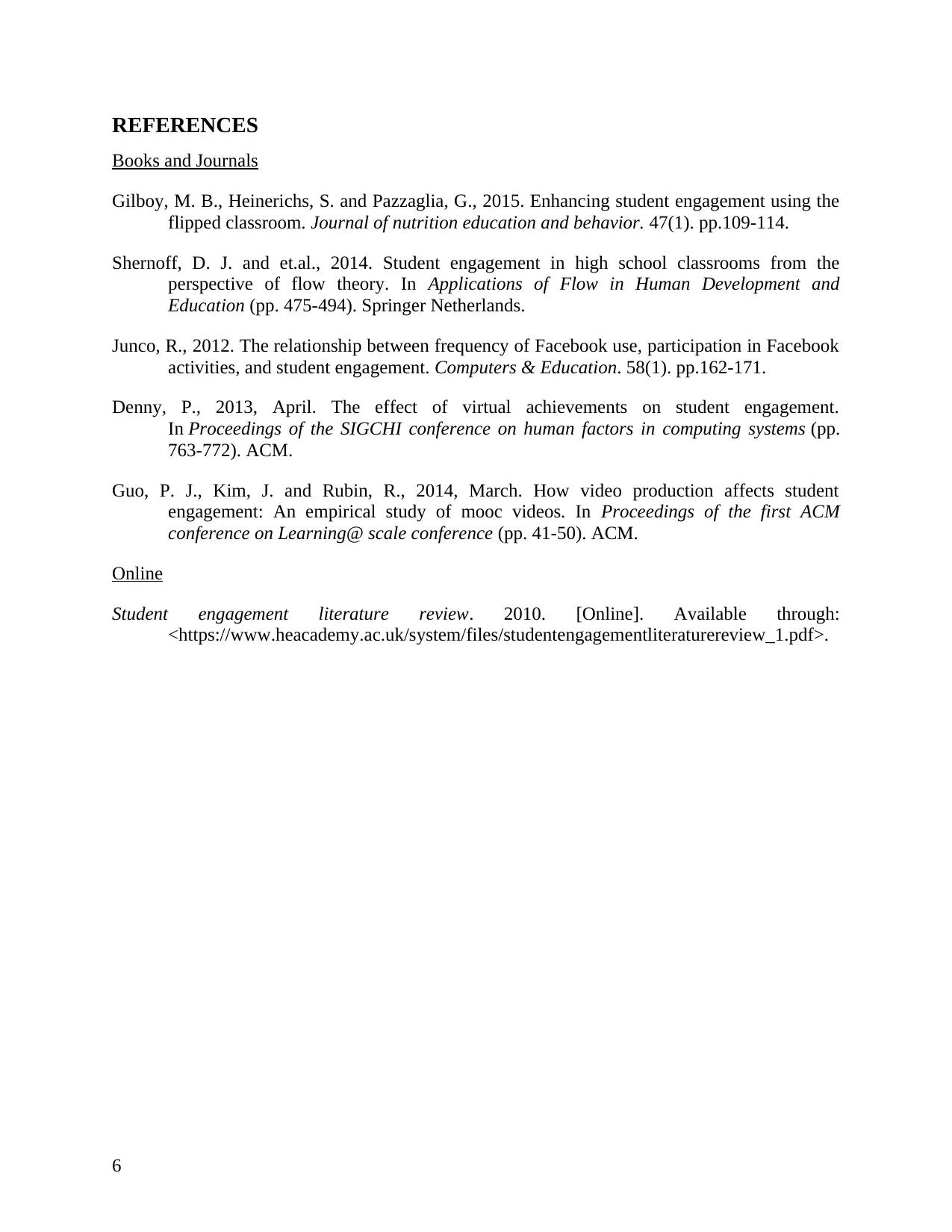
REFERENCES
Books and Journals
Gilboy, M. B., Heinerichs, S. and Pazzaglia, G., 2015. Enhancing student engagement using the
flipped classroom. Journal of nutrition education and behavior. 47(1). pp.109-114.
Shernoff, D. J. and et.al., 2014. Student engagement in high school classrooms from the
perspective of flow theory. In Applications of Flow in Human Development and
Education (pp. 475-494). Springer Netherlands.
Junco, R., 2012. The relationship between frequency of Facebook use, participation in Facebook
activities, and student engagement. Computers & Education. 58(1). pp.162-171.
Denny, P., 2013, April. The effect of virtual achievements on student engagement.
In Proceedings of the SIGCHI conference on human factors in computing systems (pp.
763-772). ACM.
Guo, P. J., Kim, J. and Rubin, R., 2014, March. How video production affects student
engagement: An empirical study of mooc videos. In Proceedings of the first ACM
conference on Learning@ scale conference (pp. 41-50). ACM.
Online
Student engagement literature review. 2010. [Online]. Available through:
<https://www.heacademy.ac.uk/system/files/studentengagementliteraturereview_1.pdf>.
6
Books and Journals
Gilboy, M. B., Heinerichs, S. and Pazzaglia, G., 2015. Enhancing student engagement using the
flipped classroom. Journal of nutrition education and behavior. 47(1). pp.109-114.
Shernoff, D. J. and et.al., 2014. Student engagement in high school classrooms from the
perspective of flow theory. In Applications of Flow in Human Development and
Education (pp. 475-494). Springer Netherlands.
Junco, R., 2012. The relationship between frequency of Facebook use, participation in Facebook
activities, and student engagement. Computers & Education. 58(1). pp.162-171.
Denny, P., 2013, April. The effect of virtual achievements on student engagement.
In Proceedings of the SIGCHI conference on human factors in computing systems (pp.
763-772). ACM.
Guo, P. J., Kim, J. and Rubin, R., 2014, March. How video production affects student
engagement: An empirical study of mooc videos. In Proceedings of the first ACM
conference on Learning@ scale conference (pp. 41-50). ACM.
Online
Student engagement literature review. 2010. [Online]. Available through:
<https://www.heacademy.ac.uk/system/files/studentengagementliteraturereview_1.pdf>.
6
⊘ This is a preview!⊘
Do you want full access?
Subscribe today to unlock all pages.

Trusted by 1+ million students worldwide
1 out of 6
Related Documents
Your All-in-One AI-Powered Toolkit for Academic Success.
+13062052269
info@desklib.com
Available 24*7 on WhatsApp / Email
![[object Object]](/_next/static/media/star-bottom.7253800d.svg)
Unlock your academic potential
Copyright © 2020–2026 A2Z Services. All Rights Reserved. Developed and managed by ZUCOL.





